
U.S. President Barack Obama instructed Gayle Smith, the White House senior director on development and democracy, and other top advisers in August to draft a “secret” report on unrest in the Arab world, suggesting that the Obama administration might have anticipated the current turmoil in the region.
According to the New York Times, the advisers - also including Dennis B. Ross, the president’s senior adviser on the Middle East, and Samantha Power, a senior director at the National Security Council - noted in the report that countries from Bahrain to Yemen were ripe for popular revolts unless governments undertake sweeping reforms.
Between Jan. 25 and Feb. 11, two authoritarian regimes in the Arab region – Zine El Abidine Ben Ali’s administration in Tunisia and Hosni Mubarak’s government in Egypt - were overthrown by street protests.
Obama issued the Presidential Study Directive to seek recommendations on how the U.S. government could encourage political reforms in Arab nations ruled by autocratic regimes, most notably Egypt, that are also valuable allies of the U.S., according to Obama’s advisers.
The 18-page classified report seeks to strike a balance between U.S. strategic interests and preventing increased instability against the democratic demands of demonstrators, the advisers told NYT.
“There’s no question Egypt was very much on the mind of the president [Obama],” said a senior official who helped draft the report. “You had all the unknowns created by Egypt’s succession picture ― and Egypt is the anchor of the region,” according to one senior official who spoke on condition of anonymity to discuss the report’s findings.
The report sets apart four Arab nations for “close scrutinty,” according to NY Times, noting that the officials refused to discuss countries in detail. Of the four nations, one is attempting to move toward reforms, another has resisted any change, and the two have deep strategic links with the U.S, as well as religious tensions. NY Times believes these countries refer to Jordan, Egypt, Bahrain and Yemen.
The report is kept confidential to prevent Arab allies from pressuring the White House, according to the officials.
Read more about U.S. development aid.








